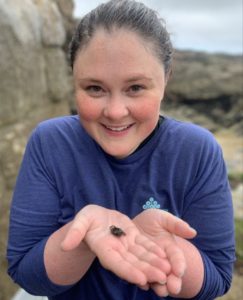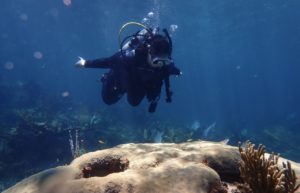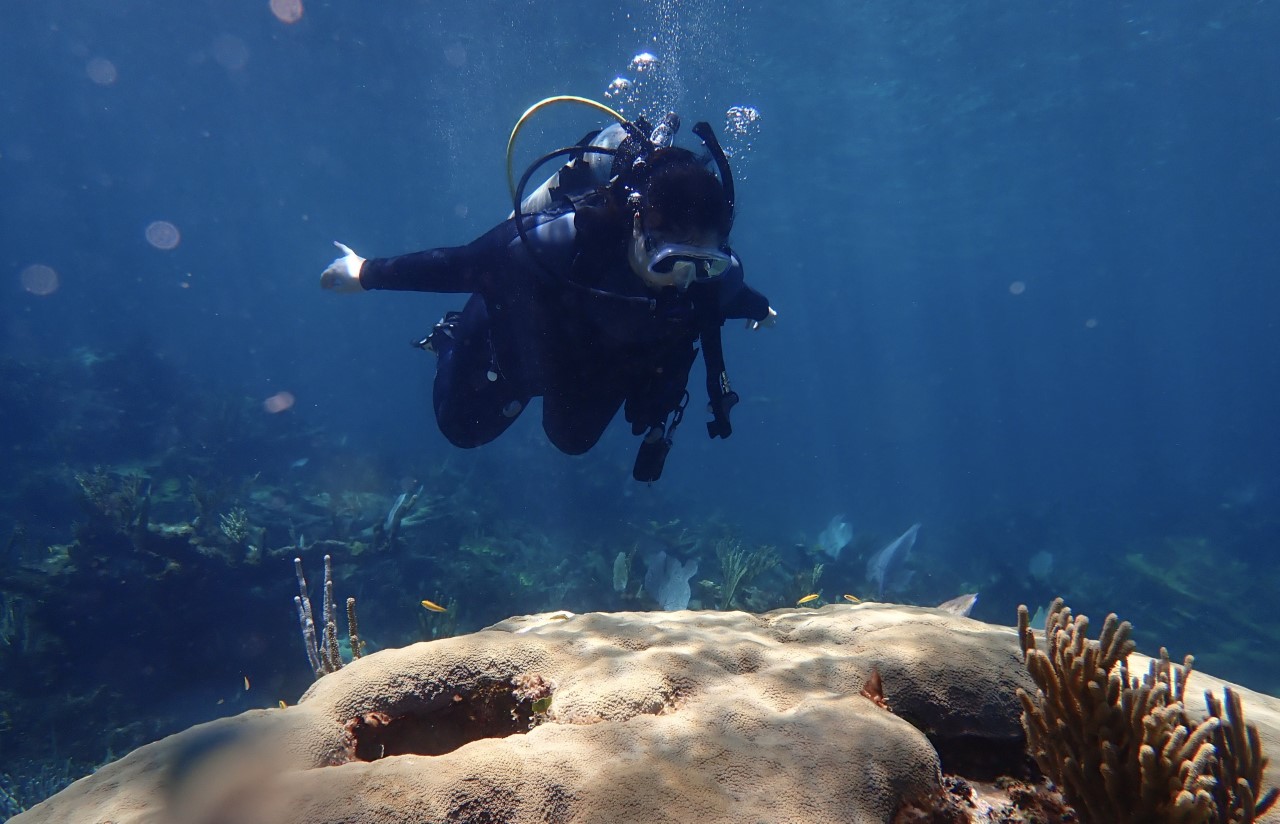We are looking back on some of our MSc graduates who have excelled in marine science around the world since studying with us. Today we meet Kara Rising, an international MSc Marine Environmental Management graduate (2021) from America and now a Research Technician in Coral Biology at the University of Derby.

Can you outline your pathway from graduating to where you are now?
To be honest, there wasn’t much of a pathway for me. I saw a job post on Twitter from a coral scientist who I followed and was familiar with his work. The job was closely aligned with my prior experience and aspirations to go into research and it would allow me to gain practical experience in aquatic animal husbandry, microbiology, molecular biology and conservation. I called this scientist that day to discuss the role and a few months, an application and two interviews later I was offered the job and moved to Derby a few days after finishing in person teaching for my masters!
What did you enjoy most about studying at the University of Exeter, Penryn Campus?
The class discussions that we had as a group of students, alongside Professor Callum Roberts and Dr Julie Hawkins who taught the degree. They did very well to facilitate thought-provoking discussions in class and between ourselves. I think this particularly helped me to dive deeper into the research and ask more questions. This, coupled with the coursework, taught me so much in just one year at Exeter.
What were the best aspects of studying your course?
I loved doing my research project with Professor Martin Stevens. When I started I had very little confidence in my ability to lead and carry out a full scientific study, however he guided me the right amount which allowed me to really explore, practice, ask questions and gain confidence. It was hard work, for sure, but I loved every second of it.
What skills and experiences did you gain that will/have been useful for job/internship applications?
For practical skills, learning statistical modelling and coding in R for data analysis has and will continue to be vital in my current job and for the rest of my career. Also, through doing my research project, undertaking a study through the phases of its concept, experimental design, data collection, analysis and write-up was something that my current job looked for in a successful candidate, as the role is heavily research-focused.

Why did you choose to study at the University of Exeter?
The research caliber of the lecturers and its overall reputation in ecology made me feel it would be a suitable fit for me.
Why did you decide that the University of Exeter Penryn Campus was the best place to study your particular subject?
Coral reef management and restoration was a big passion for me and an MSc in Marine Environmental Management that was based at the Penryn Campus seemed like the best fit for what I wanted to pursue in my career.
How would you describe your experiences studying at the Penryn Campus and living in Cornwall (e.g. facilities, student life, campus surroundings, support).
Cornwall is beautiful – I loved living near the coast and being able to go out and explore the rock pools, go for a swim and go surfing throughout the year I lived there. I think being near the sea just fuelled my fascination and passion for the subject I was studying!

Do you think there are any factors that make the University of Exeter a unique place to study?
I think just being in a place with so many great minds all there to be able to talk to and ask questions really made my experience unique. The staff listened to us during a challenging year from the COVID-19 pandemic, where for the majority of the year we worked remotely. I think their willingness to make adjustments and try to give additional opportunities was unique and really demonstrated their empathy and concern for their students.
What skills and experience have been most useful for your career? And how do you think your programme prepared you for your career/current role?
I think doing my research project in the field at Exeter helped to prepare me for my current career- while during my project there would constantly be things that had to be fixed, adjusted or re-planned. I think learning to think on my feet and troubleshoot creatively are skills that carried over into my current role and I use the most while taking care of a lab with several aquariums housing many different animals.
Why did you choose this career? And what do you enjoy most about your work?
Sometimes I feel like a child being in science, I’m in constant fascination with how organisms function and interact with their environment. I love continuously learning and I never want to lose that sense of awe about the natural world, being a researcher gives me that chance to learn and explore. Working as a Research Technician in the Aquatic Research Centre at the University of Derby has offered me the chance to ask my own questions and develop my own research projects, whilst also helping others with their research and learning the technical skills associated with our projects. It really is the best of both worlds.

What advice would you give to a current student who wishes to pursue your career?
Overall, I would say network! Go to conferences, reach out to that author on a paper you really liked, and take chances. There will be people who don’t respond, but those who do may be more likely to think of you if a position comes up that may fit your career aspirations. Or they could end up being a great collaborator in the future. Even if nothing comes of it you may still learn something just by speaking with them.
What are your plans for the future?
I hope to go on to do a PhD at some point!
What advice would you give to anyone thinking of applying to the University of Exeter?
Firstly, I would congratulate them on a good decision. Secondly, this advice might be more specific to those switching subjects or careers, but it’s easy to feel overwhelmed and believe that it’s too hard to switch careers and go back to school- but I’m walking proof that it’s never too late and you can still find success.

